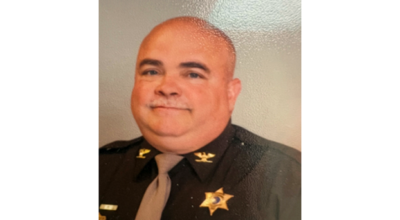Cass County officials answers questions about fracking
Published 9:46 am Thursday, February 19, 2015

More than 50 residents and local government officials attended Wednesday’s public meeting concerning fracking in Cass County. Among those speaking out against the controversial oil and gas drilling method was John Goodson, a resident of St. Joseph County, Indiana. (Leader photo/TED YOAKUM)
The conversation in Cass County surrounding the fracking of local oil and gas wells came to a boiling point Wednesday evening.
More than 50 residents and township officials filled the community room on the second floor of the Cassopolis Family Clinic, listening and asking questions during the county’s special presentation on the controversial fuel extraction method. The discussion, led by Cass County Board of Commissioners Chairperson Bernie Williamson, lasted for more than an hour, with topics ranging from an explanation of fracking, the positive and negative effects it has on the area, and what townships and other local governments can do to regulate it.
The public meeting came together following several months of work by members of the county board and other concerned members of the community. The subcommittee tasked with investigating the subject came together shortly after learning the Michigan Department of Environmental Quality issued an enhanced oil recovery permit to Columbus Oil and Gas for a number of oil fields located in Calvin Township last summer.
While the process outlined in the permit didn’t permit fracking, it caused local officials to question what legal authority it could impose should a company receive permission to use the mining method in Cass County.
“That question was brought to the board of commissioners, and it raised a number of other questions,” Williamson said. “We spent the time since then, which was late last year, until now doing our homework.”
Cass County contains 380 gas and oil wells within its limits, none of which have been fracked before, Williamson said. The term “fracking” refers to the process of pumping a mixture of water, sand and various chemicals to horizontally fracture deep rock formations, freeing pockets of oil and natural gas for extraction.
While the process itself has been in use for over 65 years, its popularity exploded around seven years ago, when implementation costs fell dramatically, Williamson said.
Among the benefits, supporters of fracking say is that the process facilitates the creation of new jobs in communities, contributes to lower overall fuel costs and decreases the country’s dependence on foreign oil.
“These are very valid arguments that people who support the process would say as to why it’s in our interest to allow exploration of these resources in our country,” Williamson said.
Opponents of the process, on the other hand, claim that fracking could lead to the contamination of wells and even possibly cause earthquakes. They also point to the growing number of sites dedicated to storing the water used in the process, which, due to the presence of chemicals within the fluid, cannot be easily disposed of.
One of the main concerns among officials in Cassopolis is the lack of control most local governments have over the wells in their jurisdiction. While cities and villages can reject certain work due to zoning ordinances, state law restricts the authority townships have when it comes to the DEQ’s issuing of drilling permits.
“Contrary to common belief, control of oil and gas drilling in Michigan has not rested with our local communities since 1943,” Williamson said. “We haven’t had the ability to do much about this for generations.”
Though townships lack the power to prevent drills from going down, there are some ways that officials can at least help regulate the process in order to make sure that it causes minimum disruption to citizens, Williamson said. Last month, Cannon Township, located in Kent County, approved three ordinances that placed restrictions on waste discharge and outdoor lighting for drilling operations within its boundaries.
“There are a number of ordinances out there that allow you to control the elements surrounding the work being done,” Williamson said. “Successful police ordinances are carefully structured to respect the rights of leasing landowner and provide protection for the community as a whole.”
Cass County townships, villages and the City of Dowagiac could follow a similar suit in the coming weeks.
The county plans on presenting a number of regulatory ordinances to other local officials during the upcoming intergovernmental forum, in hopes that they all are approved around the same period, to increase the protection of residents in case the drilling process comes to the county.
“While we may vary in our opinions as to whether fracking should be banned or increase regulation is in order, immediate action will provide protections that allow time for ongoing discussion,” Williamson said. “Our primary goal must be to take action that is legal, enforceable and provides protection before fracking or similar activities come to Cass County.”
Several members of the audience shared their thoughts about the issue, many of them agreeing that such action was necessary. Others shared their concerns about the possible negative effects that any fracking projects would have on the county’s environment.
“You can pass whatever regulations you want, whether they are enforceable or not” said Jimmy Johnson, a resident of Cassopolis. “This has an impact on discourse. It has an impact on the media. And it, on some level, can be taken under consideration further up the chain.”






